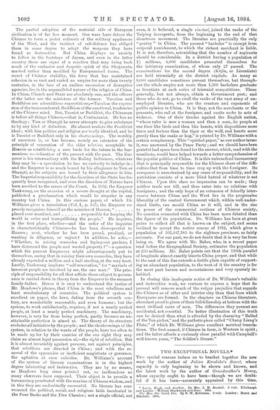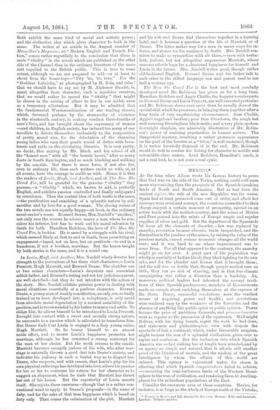TWO EXCEPTIONAL NOVELS.*
Two special reasons induce us to bracket together the new work by the author of Julian Sarslake's Secret, whose capacity is only beginning to be shown and known, and the latest work by the author of Grandmother's Money, whose capacity ought to have been—though we are doubt- ful if it has been—accurately appraised by this lime.
• Lucia, Hugh, and Another. By Mrs. J. H. Breeden. 3 vols. Edinburgh and Londor : William Blackwood and Sone. 1885. The Max She Cared For By F. W. Robinson. S vols. London : Hurst and Blackett. 1834.
Both exhibit the same kind of moral and artistic power ; and the distinctive idea which gives character to both is the same. The writer of an article in the August number of Macmillan's Magazine, on " Modern English and French Fic- tion," comes rather regretfully to the conclusion that there is more " vitality" in the novels which are published on the other side of the Channel than in the ordinary literature of the same sort supplied to the British public. This is true to some extent, although we are not prepared to add—or at least to shout from the house-tops—" Pity 'tis, 'tis true." For the " Goddess Lubricity," as photographed by M. Zola, and (alas ! that we should have to say so) by M. Alphonse Daudet, is, apart altogether from character, such a repulsive creature, that we would rather be spared the "vitality " that might be shown in the raising of altars to her in our midst, even as a temporary affectation. But it may be admitted that the fundamental Wordsworthianism of our reading classes, which, favoured perhaps by the strenuosity of existence in the nineteenth century, is making conduct three-fourths of men's lives, and has brought about the supremacy of women —and children, in English society, has induced too many of our novelists to devote themselves exclusively to the composition of pretty moral airs, for the delectation of the charming young ladies who vary their gentle round. of duties with lawn- tennis and raids on the circulating libraries. It is very pretty, no doubt, this mating by Mr. Black and his school of all the "honest men" with all "the bonnie lasses," after so many duets in South Kensington, and so much blushing and walking by the sea-side. But there is more force, if not also fire, even in ordinary life, than such writers credit us with, or, at all events, have the courage to credit us with. Hence it is that the readers of Lucia, Hugh, and Another, and of The Man She Cared For, will be grateful for the genuine " vitality " they possess,—a " vitality " which, we hasten to add, is perfectly English, and exhibits passion controlled and finally subjugated by conscience. Then the central idea of both works is the same, —the purification and ennobling of a sybaritic nature by self- sacrifice and by love for a good woman. The closing scenes of the two novels are not equally happy—at least, in the ordinary novel-reader's sense. Everard Deane, Mrs. Needell's "another," not only sees the woman he adores marry a man whom he con- siders his inferior, but has to work out his moral salvation by death for both. Hamilton Redclove, the hero of The Man She Cared For, is luckier. He is saved by a struggle with his rival, which seemed likely at first to end in death, from permitting an engagement—based, not on love, but on gratitude—to end in a humdrum, if not a loveless, marriage. But the lesson taught by both stories is the same, and it is a sound one.
In Lucia, Hugh, and Another, Mrs. Needell wisely devotes her strength to the portraiture of her three chief characters,—Lucia Prescott, Hugh Marriott, and Everard Deane. She sketches one or two minor characters—Lucia's desperate and somewhat selfish father, and Everard's doting and not too judicious parent, are well sketched—but they do not interfere with the action of the story. Mrs. Needell exhibits genuine power in dealing with moral situations essentially of a perilous character. Everard Deane, a young man of weakly constitution, an only son, so badly trained as to have developed into a voluptuary, is only saved from absolute moral degradation by a natural amiability of dis- position, and is recommended by his father to marry and settle. To oblige him, he allows himself to be introduced to Lucia Prescott. Brought into contact with a sweet and morally strong nature, he succumbs to a passion which is calculated to transform him. Bat Deane finds that Lucia is engaged to a fiery young sailor, Hugh Marriott. So he braces himself to an almost noble effort, and to secure Lucia's happiness promotes her marriage, although he has conceived a strong contempt for the man of her choice. But the moth returns to the candle. Marriott becomes savagely jealous of his wife, who after mar- riage is naturally thrown a good deal into Deane's society, and indicates his jealousy in such a brutal way as to disgust her. Deane, who suspects, and with reason, that Lucia's pity for his own physical sufferings has developed into love, allows his passion for her so far to overcome his esteem for her character as to suggest an elopement, when he finds that Marriott has thrust her out of his house. But the superiority of Lucia asserts itself. She rejects these overtures—though that is a rather con- ventional word to apply to Deane's proposals—in the name of duty, and for the sake of that true happiness which is based on duty only. Then comes the culmination of the plot. Marriott and his wife and Deane find themselves together in a burning hotel, and it becomes a question of the life of Marriott or of Deane. The latter makes way for a man in many ways his in- ferior, and atones for his weakness by death. Mrs. Needell con- trives to make us sympathise with all three,—even with turbu- lent, jealous, but not altogether ungenerous Marriott, whose remorse affords hope for a chastened happiness for himself and Lucia in the future. Mrs. Needell writes good, though rather old-fashioned English. Everard Deane and his father talk to each other in the stilted language son and parent used to use half a century ago.
The Man She Cared For is the best and most carefully developed novel Mr. Robinson has given us for a long time. Hamilton Redclove and Aggie Challis, the happier counterparts to Everard Deane and Lucia Prescott, are well-executed portraits; and Mr. Robinson shows even more than he usually does of the special skill which he possesses, in bringing them together after a long train of very unpromising circumstances. Sam Challis, Aggie's vagabond brother ; poor Dan Overdown, the rough but well-meaning Birmingham blacksmith ; and a very plain-spokeni downright chaplain, are admirably illustrative of Mr. Robin- son's power of realising angularities in human nature. The Dangerfield mystery, involving a rather grotesque appearance on the part of the heroine as a " felon," is well-sustained, though it is rather hurriedly disposed of in the end. Mr. Robinson would do well to confine his fishing for character to middle and sub-middle-class waters. Lord Redclove, Hamilton's uncle, is not a real lord, he is not even a real cynic.



































 Previous page
Previous page